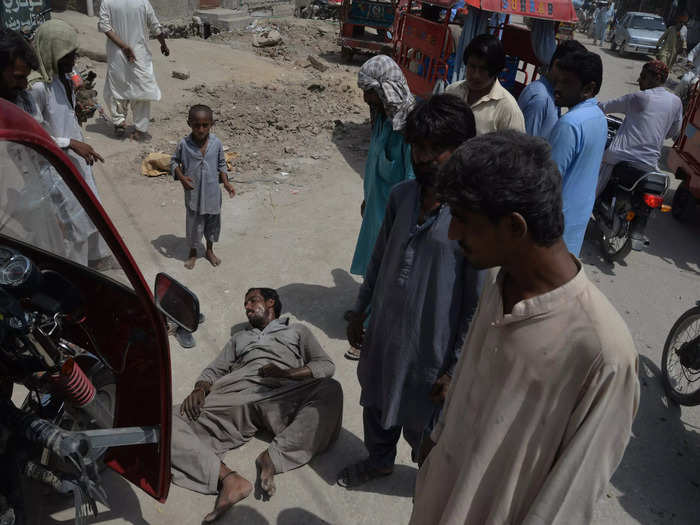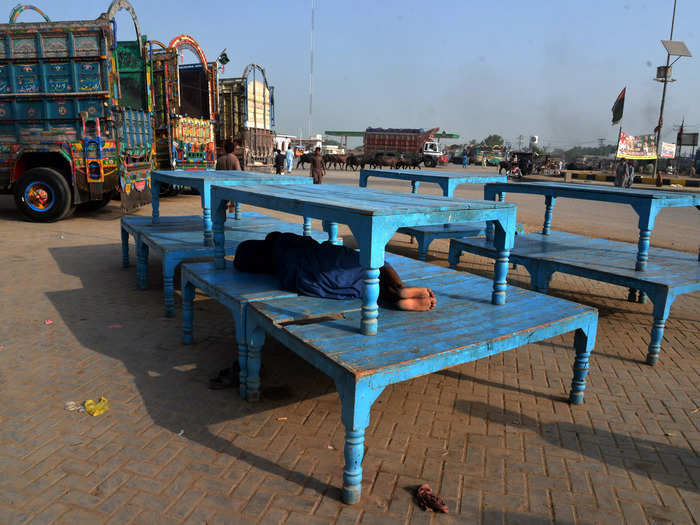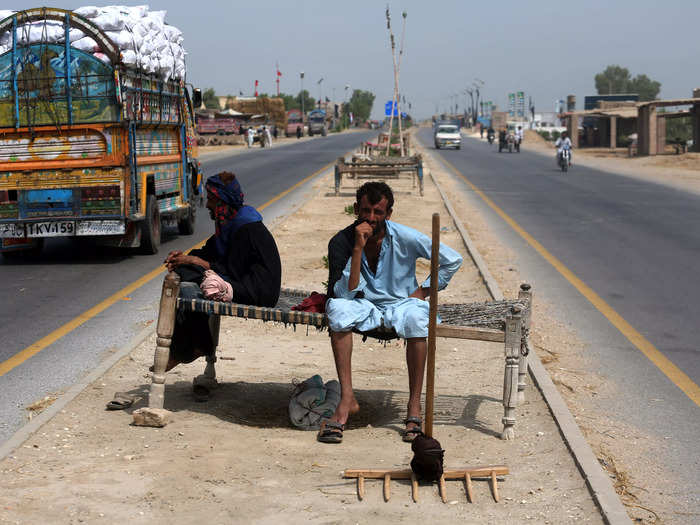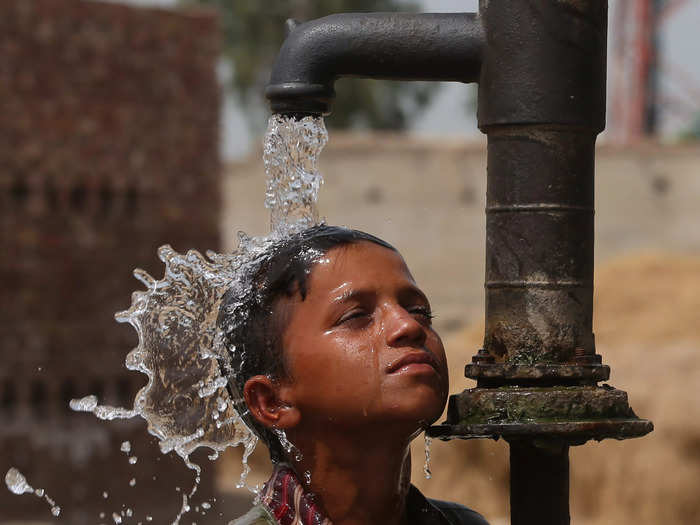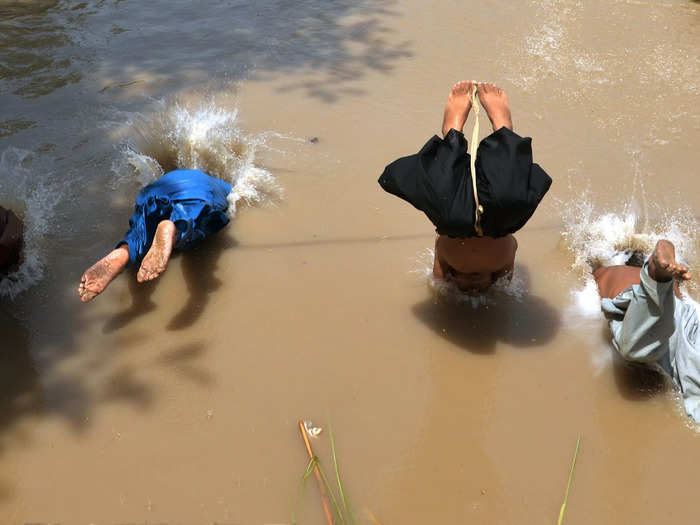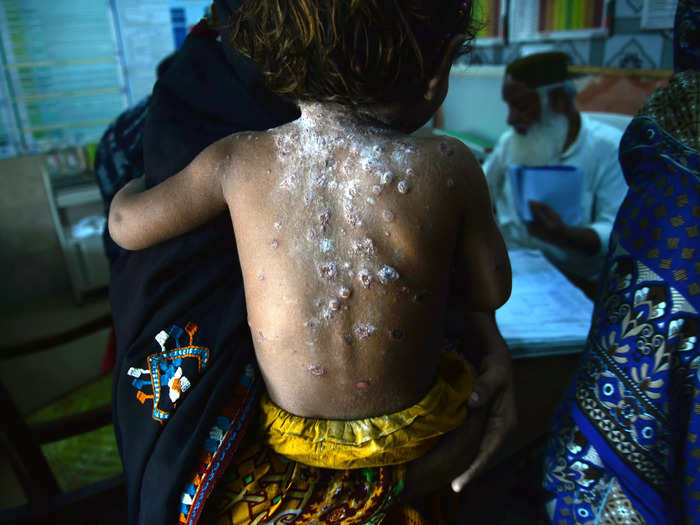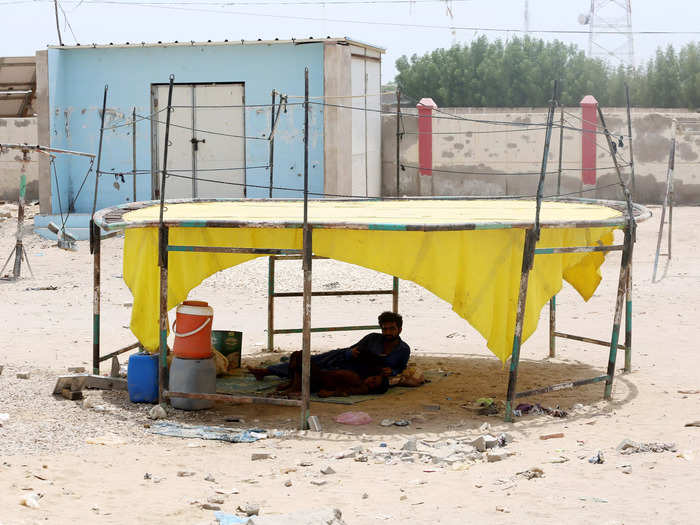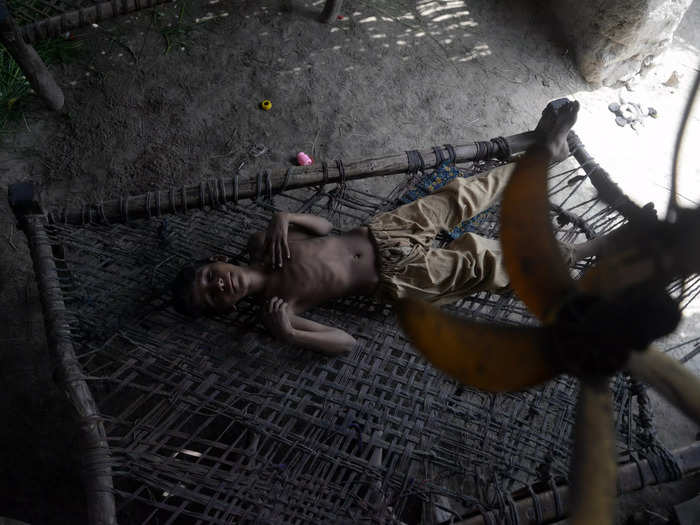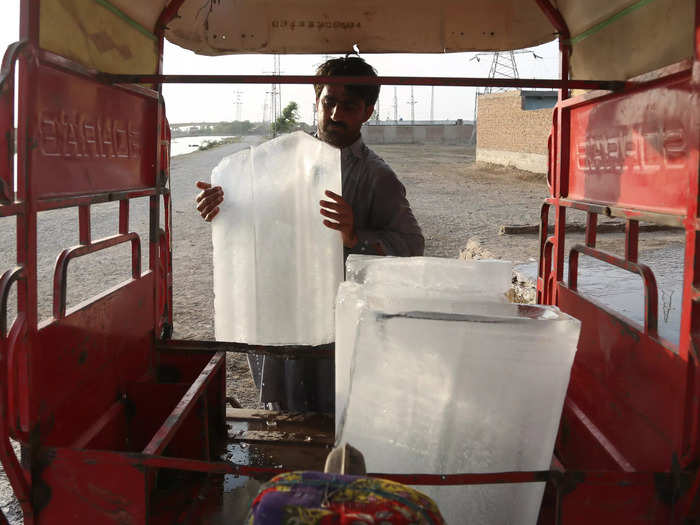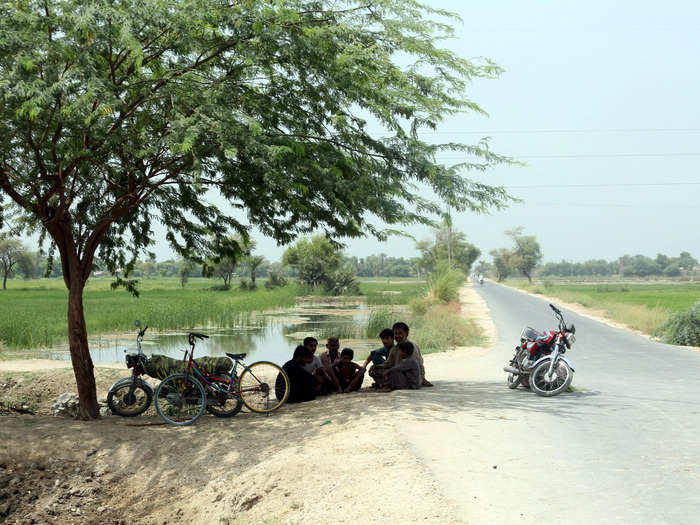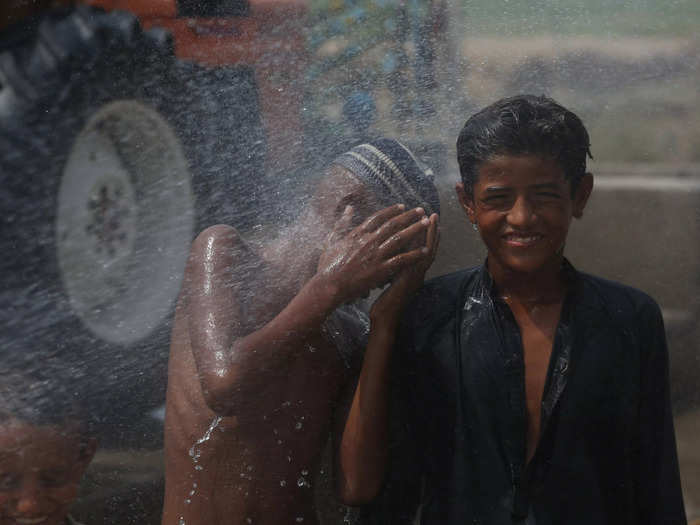A brick kiln worker in Jacobabad, Pakistan, one of the world's hottest cities.Shakil Adil/Amnesty International
- Due to climate change, temperatures in Jacobabad, Pakistan have soared. In June 2021, the hottest day hit 125°F.
- Jacobabad's residents' lives' are entirely dominated by their desperate quest to escape the heat.
The city of Jacobabad, in Sindh, Pakistan, is one of the hottest cities on earth.
In recent years, due to climate change, temperatures in Jacobabad have soared. In June 2021, the hottest day hit 125°F (52°C).
Over the past few decades, on several occasions, temperatures and humidity levels have reached a threshold described by experts as "hotter than a human body can handle"- one of only two cities in the world to hold that status.
At these heat and humidity levels, the human body's mechanisms to cool itself stop functioning.
A new report from Amnesty International chronicles the lives of Jacobabad residents, whose days are dominated by their quest to escape the heat.
Ahead of the COP26 climate conference in Glasgow, Amnesty urged industrialized countries to help developing countries face the unprecedented threat.
Pakistan is one of the most climate-vulnerable countries in the world.
A man passes out from heatstroke in the middle of the road in Jacobabad, Pakistan.
Shakil Adil/Amnesty International
Pakistan is expected to be among the countries worst affected by rising temperatures over the coming decades, according to Amnesty International.
For residents of Jacobabad in the province of Sindh, climate change is not a distant threat, but a lived reality.
Passing out from heatstroke is commonplace, and residents spend their days desperately seeking relief from the heat.
The city offers a glimpse into what life could look like in many other parts of the world.
Those living in poverty are most vulnerable.
A truck driver takes a nap under stacked tables in the blazing heat in Jacobabad, Pakistan.
Shakil Adil/Amnesty International
Those living in poverty are especially vulnerable to the effects of climate change, unable to access electricity, clean water, or adequate shelter.
Many men in Jacobabad work as daily wage laborers and are especially exposed to the heat.
Brick kiln workers, of which there are 5,000 in the city, produce a daily quota of 1000 bricks for less than $5 a day, Amnesty International said.
They work next to boiling ovens in the open air, often with no protection from the heat.
"It's hard to breathe when it is that hot, but if I rest, my family and I will go hungry. So how can I take a break?" said Gulab Birohi, a 70-year-old farmhand and brick kiln worker told Amnesty International.
Residents resort to desperate measures for relief from the heat.
Many laborers and families place their charpoys on the divider on two-way roads so that gusts of wind from passing vehicles offer them some respite, even as they are forced to breathe toxic fumes from car emissions, in Jacobabad, Pakistan.
Shakil Adil/Amnesty International
Many place their beds in the middle of two-way roads so that gusts of wind from passing vehicles offer them some relief, even if they have to breathe toxic fumes from car emissions.
Children often cool off by dousing themselves in water.
A child cools off with a hand-operated pump, his only respite in searing temperatures in Jacobabad, Pakistan.
Shakil Adil/Amnesty International
Resident Shah Bux told Amnesty International that to combat the heat, "children go to bed in wet clothes. It's the only way they can sleep."
Children swim in dirty puddles to escape the heat.
Children swim in dirty puddles to escape the heat.
Shakil Adil/Amnesty International
Women are disproportionately affected by the extreme heat in Jacobabad, Amnesty International said, as they cannot access cooling mechanisms available to men and children.
Because of social conventions in the Islamic country, women cannot cool off by jumping into bodies of water and could face gender-based violence if they slept outdoors.
Many residents suffer from health problems linked to the sun and heat.
A toddler receives treatment at a clinic for a skin condition caused by exposure to the sun in Jacobabad, Pakistan.
Shakil Adil/Amnesty International
Children in Jacobabad often suffer from skin conditions including severe sunburn, prickly heat, and abscesses linked to sun exposure and poor hygiene.
Extreme heat can cause various health issues, including kidney and heart problems, and even brain damage, The Technology Review says, citing Liz Hanna, a former public health researcher at the Australian National University, who studies extreme heat.
People build make-shift shelters to escape the rising temperatures.
A man makes a makeshift shelter from a discarded trampoline in Jacobabad, Pakistan.
Shakil Adil/Amnesty International
Jacobabad residents told Amnesty International that it feels hotter each year.
Farmers said that mangoes and dates that they grow ripen faster now, because of the heat.
A disabled NGO worker who has a tricycle wheelchair said he has to regularly replaced his as the rubber wears out more quickly because of how hot the ground gets.
Pakistan's energy crisis exacerbates the difficulties of life in Jacobabad.
An emaciated child seeks relief under a solar-powered fan, charged by a small battery in his home in Jacobabad, Pakistan.
Shakil Adil/Amnesty International
Along with rising temperatures and an impending climate crisis, Pakistan is also facing an energy crisis.
Although solar panels are becoming increasingly popular, they are too expensive for daily wage laborers in Jacobabad.
Abdul Malik, a brick kiln worker who makes less than $5 a day, told Amnesty International,
"Should I buy a solar power battery or food for my children?
Ice factories have cropped up as a lucrative business.
An ice-seller in Jacobabad, Pakistan.
Shakil Adil/Amnesty International
Many Jacobabad residents cannot afford refrigerators, and even if they can, the constant power outages and lack of electricity mean they are often useless.
As a result, buying ice is a necessary expense, where many use it to cool concrete floors.
Unchecked deforestation means that trees and shade are scarce.
People huddle under a tree, one of the few remaining, that offers them shade in Jacobabad, Pakistan.
Shakil Adil/Amnesty International
Firewood remains the primary energy source for many, reducing the city's tree cover.
While official data is not available on Jacobabad specifically, Amnesty International said the World Wide Fund for Nature estimates only 5.7% of Pakistan's land is under forest cover.
Pakistan's Prime Minister Imran Khan has announced a range of plans to combat climate change, including the "Billion Tree Tsunami" plantation drive.
However, Amnesty International said that so far, no reforestation programs had reached Jacobabad, and the city's residents have been provided with few resources to cope with the heat.
Climate change will exacerbate existing poverty and inequality.
Children cool off in Jacobabad, Pakistan.
Shakil Adil/Amnesty International
Amnesty International warns that even if Pakistan fully met its human rights obligations in protecting its residents from climate change, it would not be enough.
Developing countries will bear an estimated 75-80% of the cost of climate change, according to UN OHCHR, Special Rapporteur for extreme poverty.
"States that have contributed the most to the climate crisis and those with most available resources have heightened obligations, " the Amnesty International report said.
They added that such countries should work to decarbonize their economies and support vulnerable developing countries.

